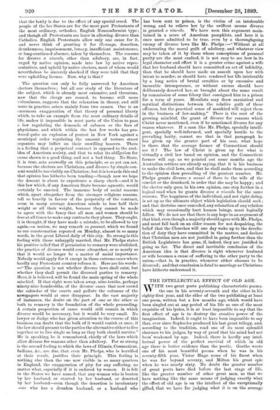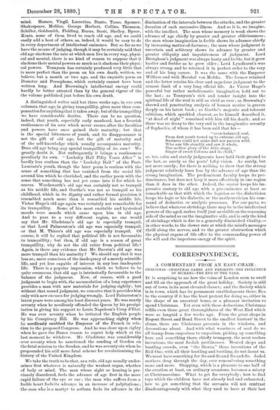THE INTELLECTUAL EFFECT OF OLD AGE.
WITH two great poets publishing characteristic poems, the one in his seventy-seventh and the other in his eighty-first year, and the elder of the two publishing at least one poem, written but a few months ago, which would have been singled out at any period of his life as one of the most exquisite of his lyrics, it is at least impossible to say that the first effect of age is to destroy the creative power of the imagination. Indeed, it ought to have been impossible to say that, ever since Sophocles produced his last great trilogy, and, according to the tradition, read one of its most splendid choruses to his judges, by way of proof that his mind had not been" weakened by age. Indeed, there is hardly any intel- lectual power of the perfect survival of which in old age there is better evidence than the poetic. Goethe wrote one of his most beautiful poems when he was in his seventy-fifth year, Victor Hugo some of his finest when he was far beyond seventy, and Milton his great epic when he was nearly sixty. No doubt the greater number of great poets have died before the last stage of life, like the greater number of other great men, so that we have nothing like the same means of judging exactly what the effect of old age is on the intellect of the exceptionally gifted, that we have for judging what it is on the average -mind. Horace, Virgil, Lucretius, Dante, Tasso, Spenser, 'Shakespeare, Moliere; George Herbert, Collins, Thomson, =Schiller, Goldsmith, Fielding, Barns, Scott, Shelley, Byron, Keats, none of them lived to reach old age, and we could easily add a host of others, as, indeed, it would be easy to do in every department of intellectual eminence. But so far as we 'have the means of judging, though it may be certainly said that old age slackens the rate at which men live in every way, physi- cal and mental, there is no kind of reason to suppose that it -slackens their mental powers so much as it slackens their physi- cal powers. Tennyson has cer ainly produced very little that is more perfect than the poem on his own death, written, we believe, but a month or two ago, and the exquisite poem on Demeter and Persephone, which certainly cannot have been written long. And Browning's intellectual energy could .hardly be better attested than by the general vigour of the the volume published just before his own death.
A distinguished writer said but three weeks ago, in our own columns, that age, in giving tranquillity, gives more than com- pensation for anything that it takes away; but of the tranquillity we have considerable doubts. There can be no question, indeed, that youth, especially early manhood, has a feverish • restlessness of its own which never recurs after the faculties and powers have once gained their maturity; but that is the special bitterness of youth, and its disappearance is not the gift of old age, but the gift of maturity and -of the self-knowledge which usually accompanies maturity. Does old age bring any special tranquillity of its own 9 We greatly doubt it. Not nnfrequently it brings a restlessness -peculiarly its own. " Locksley Hall Fifty Years After" is -hardly less restless than the " Locksley Hall " of the Poet- Laureate's youth, though the later poem is restless with the sense of something that has vanished from the social life -around him which he cherished, and the earlier poem with the sense that something has not yet come into it for which he craves. Wordsworth's old age was certainly not so tranquil as his middle life, and Goethe's was not so tranquil as his childhood, which in its dignity and rather formal precision it -resembled much more than it resembled his middle life. Victor Hugo's old age again was certainly not remarkable for as tranquillity. Some of his most excitable and hysterical moods were moods which came upon him in old age. And to pass to a very different region, no one would say that Mr. Gladstone's old age is especially tranquil, -or that Lord Palmerston's old age was especially tranquil, -or that M. Thiers's old age was especially tranquil. Of course, it will be replied that political life is not favourable to tranquillity; but then, if old age is a season of great tranquillity, why do not the old retire from political life ? Again, is there any evidence that Mr. Darwin's old age was more tranquil than his maturity ? We should say that it was less so ; more conscious of the inadequacy of a merely scientific life, and yet less capable of interest in any less inadequate life. There is a popular impression, which we believe to be quite erroneous, that old age is intrinsically favourable to the balance of the judgment. Now, of course, with a good judgment to begin with, the accumulation of a long experience provides a man with new materials for judging rightly; but without that sound judgment, we conceive that it provides him only with new excuses for judging wrongly. Lord Palmerston's latest years were among his least discreet years. He was nearly seventy when he needlessly offended the Queen by his precipi- tation in giving his support to Louis Napoleon's Coup d'Etat. He was over seventy when he irritated the English people by his Conspiracy Bill. He was approaching eighty when he needlessly snubbed the Emperor of the French in rela- tion to the proposed Congress. And he was close upon eighty when he gave the Danes reason to expect help which at the last moment he withdrew. Mr. Gladstone was considerably -over seventy when he sanctioned the sending of Gordon on the fatal mission to the Soudan, and he was seventy-six when he propounded his still more fatal scheme for revolutionising the history of the United Kingdom.
We take the truth to be that, as a rule, old age usually under- -mines first whatever is naturally the weakest organ, whether of body or mind. The man whose sight or hearing is pre- viously disordered, feels the advance of age first in the more )rapid failure of the eye or ear ; the man who suffers from a feeble heart feels its advance in an increase of palpitations ; -the man who is a martyr to asthma feels its advance in the
diminution of the intervals between the attacks, and the greater duration of each successive illness. And so it is, we imagine, with the intellect. The man whose memory is weak shows the advance of age chiefly by greater and greater obliviousness ; the man whose imagination is feeble shows its advance chiefly by increasing matter-of-factness ; the man whose judgment is uncertain and arbitrary shows its advance by greater and greater obliquity and impulsiveness of judgment. Lord Brougham's judgment was always hasty and feeble, but it grew hastier and feebler as he grew older ; Lord Lyndhurst's was always strong, and he retained it in perfect order to the very end of his long career. It was the same with the Emperor William and with Marshal von Moltke. The former retained and the latter retains his clear and sagacious judgment to the utmost limit of a very long official life. As Victor Hugo's powerful but rather melodramatic imagination held out to the last ; as Tennyson's rich and tender insight into the spiritual life of the soul is still as vivid as ever ; as Browning's shrewd and penetrating analysis of human motive is graven deeply on his latest book ; as Goethe's majestic and tolerant criticism, which sparkled clearest, as he himself described it, "at dead of night" remained with him till his death ; and as there was no decay to the very end in the imaginative serenity of Sophocles, of whom it has been said that his-
"even-balanced soul, From first youth tested up to extreme old age, Business could not make dull nor passion wild, Who saw life steadily and saw it whole, The mellow glory of the Attic stage,
Singer of sweet Colonus and its child,"
so, too, calm and stately judgments have held their ground to
the last, as surely as the poets' lofty vision. As surely, but not more surely; for there is nothing to show that the strong judgment relatively loses less by the advance of age than the strong imagination. The predominant faculty keeps its pre- dominance, but does not keep it more effectively in one region than it does in the other. Indeed, the orator keeps his im- pressive oratory to old age with a pre-eminence at least as remarkable as that with which the logician or the dialectician keeps his logic or his dialectic, or the mathematician his com- mand of deductive or analytic processes. For our parts, we believe that whatever shrinkage there may be in the intellectual powers of the aged, makes itself just as visible on the reasoning side of the mind as on the imaginative side, and is only the kind of shrinkage which is due to a generally diminished vitality,— in other words, to the slower rate at which the mind's messages thrill along the nerves, and to the greater obstruction which the physical organs of life offer to the commanding power of the will and the imperious energy of the spirit.



































 Previous page
Previous page